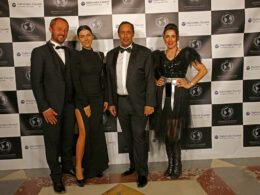Doha, Qatar — After intense challenges and rigorous evaluations, five contestants on Season 15 of Stars of Science – Qatar Foundation’sArab edutainment TV show that promotes scientific innovation in the region – have proceeded towards the next stage of the competition, known as the ‘design’ stage.
With two more participants eliminated in the last two rounds, the remaining five innovators now stand ready to present their prototypes to the jurors. Displaying ingenuity in promoting animal welfare and modernizing traditional sports in this season of Stars of Science, are contestants Mohammed Laouacheria, and Amir Mattar Jaber Alenezi.
Algerian contestant, Laouacheria, has turned to AI for monitoring animal health. His wearable device for cows monitors bio-signals from the animal to identify the onset of any disease or other health conditions to enable timely preventive measures. His invention provides continuous real-time health monitoring of the animals, while also enhancing their productivity.
For Bahraini contestant, Alenezi, a passion for the sport of falconry led to the creation of the falcon training device, comprising a communication module, a telemetry system to gather data on speed and location, and a robotic arm to emulate the hand gestures of a human. His aim to revolutionize falconry extends beyond the sport’s high-spending market as he seeks to automate and computerize the process, making it accessible to more enthusiasts.
Al Gannas Qatari Society is a Doha-based cultural association for falconers and falconry, that also encourages scientific research in the field of traditional Arabian hunting. Encouraging the innovation being put forth on Stars of Science in the arena of traditional sports, the president of Al Gannas Qatari Society, Ali bin Khatem Al-Mehshadi said: “In the quest to keep our fondest traditions alive, one also needs to adapt with the changing times. This also means being more sensitive to issues of animal ethics and safety in our sports, a cause that Stars of Science has tried to address throughout the different seasons of the show”.
In previous seasons as well, contestants have often resorted to using AI to promote animal safety. In Season 13, Omani engineer Marwan Al Jawhari’s Camel Black Box, a bracelet with Bluetooth transmission, is an excellent example of how AI can play an important role in tackling challenges specific to the region, such as reducing the number of fatalities and traffic accidents involving stray camels.
Dr. Youcef Fermi from Algeria, a candidate from Season 14, introduced us to a novel method of Scorpion Venom Safe Milking, which seeks to revolutionize venom extraction methods. Fermi continues to develop further on his methodology and believes it will soon become a standard for venom collection worldwide.
Commenting on the role of Stars of Science in promoting the use of modern technology for traditional animal farming, Francis Higgins, Head of Sustainability and Communications of Baladna, Qatar’s largest and leading dairy producer, says: “Sustainable farming and the livestock industry have emerged as the driving forces of innovation, reflecting the urgent need to address environmental concerns and secure food sustainability in the Middle East. It is indeed impressive to see contestants on Stars of Science harness technology and creativity to devise solutions that foster growth in the agricultural domain.”









